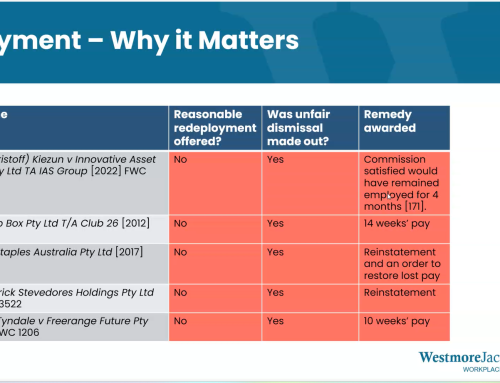
Many of the new powers that employers have under the jobkeeper amendments to the Fair Work Act 2009 (Cth) (“FW Act”) cannot be exercised unreasonably in all of the circumstances.
The Transport Workers Union of Australia v Prosegur Australia is the first Full Bench authority which has considered the meaning of “unreasonable in all circumstances”.
In this decision, the Commission held that an employer’s direction to reduce full-timers’ hours, but not necessarily the hours of part-timers, was unreasonable.
The decision also provides useful guidance about what needs to be considered when issuing a jobkeeper enabling direction under the FW Act, which is summarised in this article.
What are the “jobkeeper enabling directions”?
In response to the economic challenges posed by COVID-19, the FW Act was amended to include Part 6-4C. This part authorises the employer to give a direction to a jobkeeper employee, which can modify or remove their entitlements under the FW Act, modern awards, enterprise agreements, and/or their contract of employment.
There are three types of a jobkeeper enabling directions:
- a jobkeeper enabling stand down direction, including a direction to reduce an employee’s hours, under s789GDC;
- a direction in relation to the duties to be performed by the employee under s789GE, and
- a direction to perform duties at a place different from the employee’s normal place of work, including their home, under s789GF.
For each direction to be authorised under the FW Act, the employer and an employee should be qualified for the jobkeeper scheme, and the direction should be issued after 9 April 2020. Additional specific requirements also apply.
Importantly, a jobkeeper enabling direction will be ineffective if it is unreasonable in all circumstances.
What is “unreasonable in all circumstances”?
In Transport Workers Union of Australia v Prosegur Australia, the employer, Prosegur, issued a direction to its employees. The direction intended to set minimum working hours at 50 per fortnight, with other additional hours spread evenly across all categories of employees.
This was due to a 35% reduction in required labour hours and the COVID-19 impact on Prosegur’s usual business operations.
The practical effect of this direction was that full-time employees (who had previously worked a minimum of 38 hours a week), part-time and casual employees were required to work 25 hours per week. That meant that some long-term casuals and part-time workers were required to work, in fact, more hours than before.
The Transport Workers Union (TWU) argued the disproportionate reduction of hours for full-time workers was inherently unfair and brought a dispute to the Fair Work Commission claiming that that Prosegur’s direction was unreasonable. TWU lost in the first instance and appealed the decision.
On appeal, the Full Bench of the Fair Work Commission held that, at the first instance, the Deputy President erred in construing the expression “unreasonable in all of the circumstances” in s789GK. This is because the statutory context of the FW Act and the object of Part 6-4C does not exclude the notions of unfairness and inequity between the employer and employee.
The Full Bench further concluded (at
- The object of Part 6-4C in s789GB requires a balance to be found between the interests of employers and interests of employees.
“(2) …It is apparent that s789GK is directed to the protection of the interests of the employee from unreasonable use of the jobkeeper direction power, and therefore directs attention to the interests of the employee in an assessment of what is unreasonable.
(3) The restraint in s 789GK is that the direction is unreasonable in all of the circumstances. These circumstances necessarily include the relevant circumstances of the employee. …
(4) The position in the above respect is confirmed by the statutory note to s 789GK, which gives as an example the impact on an employee’s caring responsibilities as rendering a jobkeeper direction unreasonable. That is, this is an example of a way in which the employee’s particular interests may render a jobkeeper direction to be non-applicable to the employee because it is unreasonable.”
The Full Bench also held that (at [38]):
“…The assessment of the reasonableness or otherwise of the direction must take into account in a significant way the statutory, award, agreement and contractual entitlements of the employees which are affected by the direction. There was little evidence about this. It can safely be said that the full-time employees have an entitlement to 38 paid ordinary hours per week and that part-time employees have an entitlement to a fixed number of ordinary hours per week which is less than 38 (but is otherwise unknown). The long-term regular casual employees have no entitlement to a fixed number of ordinary hours, but merely an expectation of ongoing work, and the 25 percent casual loading which they receive compensates, in part, for this lack of guaranteed hours. We consider that the assessment of the reasonableness of the direction must take into account whether the deprivation or reduction of pre-existing entitlements to hours of work disproportionately and unfairly affects one category of employee over another. Prima facie, the direction imposes a disproportionate reduction in entitlements for full-time employees. …”
Conclusion
This decision shows that treating all employees the same when issuing a jobkeeper enabling direction is fraught with danger. The employer is required to diversify their approach depending on the statutory, award, agreement and contractual entitlements of the employees and their individual circumstances (such as employees’ caring responsibilities). This is because the direction should be at least fair and equitable to an employee in all the circumstances.
This means if a direction is issued to reduce an employee’s hours, it may need to:
- be applied relatively proportionately based on the employee’s category (full-time, part-time or long-term casual); and
- take the individual circumstances of an employee into account.
Adam Colquhoun, Principal
This article is general information only. It is not legal advice. If you need legal advice, please contact us.





